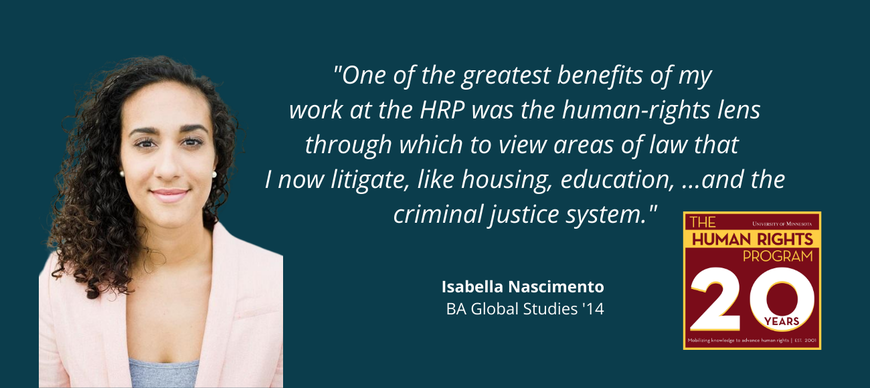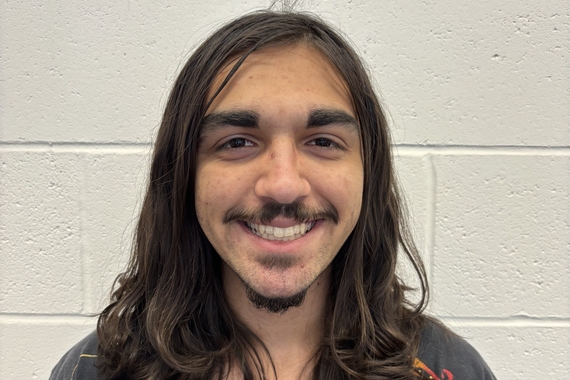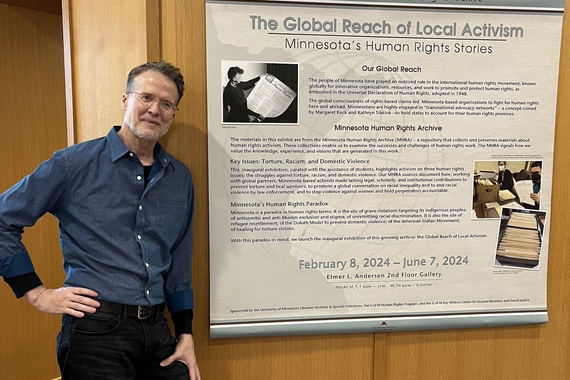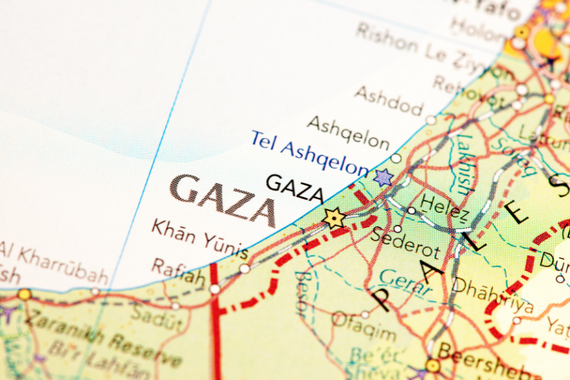20th Anniversary Alumni Reflections: Isabella Nascimento
In celebration of the Human Rights Program's 20th Anniversary, Isabella Nascimento (BA Global Studies '14) recently reflected on her time with the HRP and the impact the experience had on her future career path.
Human Rights Program (HRP): What did you do with the Human Rights Program while you were a student at the University of Minnesota?
Isabella Nascimento (IN): As an intern with the Human Rights Program, I worked on a number of fascinating projects. There are too many to list, so I will give quick summaries of my two favorites. First, I researched Tamms Supermax, a now-closed Illinois correctional facility. What I learned was that this was no ordinary prison--it was notorious for its degrading and inhumane conditions, like placing its residents in solitary confinement (think, total isolation for about 22 hours a day) for upwards of 8 years. Through this research, I found a passion for advocating on behalf of incarcerated individuals. Today, I have three decarceration lawsuits ongoing, two against the Minnesota Department of Corrections and one against the Federal Bureau of Prisons, for their complete mishandling of COVID-19 in their Minnesota facilities and their extreme disregard for the value of the lives of those people committed to their custody.
Second, I compiled research on reframing the national gun-violence conversation as an issue of human rights. Building on the research I conducted, I helped plan and execute a conference on the topic, bringing in a guest speaker from, for example, Chicago, IL, a city often in the news for its high rates of gun violence. This was a very formative experience for me; shortly thereafter, I decided to write my senior thesis on the loopholes in U.S. firearm laws and what common sense gun safety legislation should be immediately passed here. I was fortunate to have Human Rights Program Director Barbara Frey mentor me through that process. Through this work, I developed an even greater interest in the racial disparities of those charged criminally with firearm-related offenses here in the U.S. During law school, I worked in the Federal Criminal Justice Clinic, on their Stash House litigation, where we launched a coordinated challenge across more than 40 cases against the ATF's discriminatory, racially-motivated process of targeting Black and Brown people to get them to commit gun and drug crimes, just to enhance the penalties our clients would face at sentencing.
In both of these instances, the work I did with the Human Rights Program was a direct launch pad into areas of the law about which I am very passionate. I was better prepared to jump into my future projects because of the guidance, mentorship, and continuous push to dive deeper into these topics. It is now my career to litigate those issues that I began addressing in my undergraduate program.
HRP: How did your work with the HRP affect your career path?
and basic human rights of all Minnesotans."
IN: I can draw a straight line from my internship with the Human Rights Program to the work I do now. After working at the HRP, I moved to the Legal Rights Center (LRC), a non-profit public defender organization that practices community, client-centered criminal defense. I observed a lot of overlap between my research at HRP, which was mostly internationally focused, and the LRC; what I realized was that, at the LRC, they were doing community-based human rights work right (really, an inward-looking evaluation of the U.S.'s record on human rights), and I knew that was what I wanted to do, too. To do that work, I decided it would be necessary for me to go to law school, which I did, during which I participated in a number of clinics and took every human rights/civil rights course offered.
Ultimately, one of the greatest benefits of my work at the HRP was the human-rights lens through which to view areas of law which I now litigate, like housing, education, access to food, decarceration, policing, the criminal legal system, re-entry, and more. So much of the national conversation fails to discuss these for what they are: fundamental human rights, necessary for any society and its citizenry to survive and to thrive. I was immersed in that language at the HRP, and I carry it with me still. It makes advocating on behalf of my clients very easy, because it is hard for someone to say, "No, basic shelter or a quality education isn't a fundamental right." If they admit that, then seemingly I've won my case; if they don't, they seem pretty heartless. So I spend a lot of time in my cases boiling the issues down for the courts to these very basic truths, and for that, I have the HRP to thank.
HRP: What are you doing now?
IN: I am now a Staff Attorney with the American Civil Liberties Union of Minnesota, where I fight for the protection or restoration of civil rights and basic human rights of all Minnesotans. For example, I am currently litigating a case against the City of Minneapolis and Hennepin County for the rights of unsheltered homeless people to have a place to safely sleep, when the City and the County are not providing them with adequate temporary indoor shelter or permanent, deeply affordable housing, and to be free from the government destroying their belongings, like their tents, blankets, winter clothes, and forms of identification. The right to safe housing and the right to your personal property, even if you are poor, are fundamental human rights, and when the government interferes with them, that is where I step in. Being able to weave together the language of civil rights and human rights comes from the time I spent learning at the Human Rights Program, an invaluable experience for which I am so grateful.



